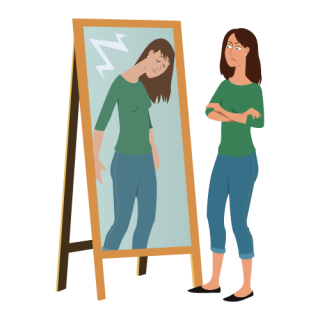Embarrassment
When Criticism Turns to Shame (And When It Doesn't)
Let's call it shame.
Posted December 19, 2022 Reviewed by Lybi Ma
Key points
- Shame is an annihilating experience that often arises when we are criticized.
- How others care for us, and how we care for ourselves, determines whether shame takes over.
- Becoming an UnShaming witness means being present with another's experience in difficult moments.
A man stands up to give a talk to a group of people. In the middle of the talk, someone yells out, "You don't know what you're talking about."
The speaker stops talking. He freezes. He doesn't know what to do or say. The audience also freezes and waits to see what he will do.
.png.jpg?itok=0eErtmYd)
Inside he thinks, "What did I do wrong? Maybe I didn't prepare well enough. How come I can't figure out how to respond to this person? Everyone's looking at me and is seeing me look like a deer in headlights. I should be able to do something, but I can't. What the hell is wrong with me, I need to do something?"
Many people confuse being criticized with being shamed.
They are not the same. However, shame can result from being criticized.
Three things are happening in this story.
First, the man was criticized in public. Public criticism is even harder to deal with for many people than private criticism. The criticism pierces right through him. It hurts like hell.
Second, no one in the audience responds. No one bears witness to the painfulness of the event. No one challenges the critic or even says, "Wow, how impolite." Or, "Ouch, that must have hurt." Or, "Are you okay; that would be super difficult for me."
Third, inside the man, he is questioning himself, thinking about what he has done wrong or what he should be able to do. He believes he must overcome his hurt, his humiliation, and his frozenness. He believes he should be stronger, clearer, and respond differently.
Take these one at a time:
1) Everyone experiences criticism many times in their lives.
Criticism is often like an assault; it can hurt, knock you down, or put you down. If it is done in public, it can be even more painful, even humiliating.
However, criticism in itself does not create shame (even though when we listen to experts give us examples, they almost always tell stories of people being criticized).
What could happen that would make it non-shaming?
The person may not feel hurt or injured at all. Sometimes criticism is not taken in, it doesn't pierce the psyche. We dismiss the person who criticized us or we may even know that the criticism has a bit of truth that we are well aware of and thus it no longer affects us. We may be relatively detached.
Or, the person may be able to respond and defend themselves. They might stop and say. "That's a very strong criticism you have made. I felt stunned for a moment. I would love to hear your viewpoint, but I'm not only open to the way you shouted out at me. Let's have a dialogue."
Or they might even say, "Not only do I disagree with your statement, but I find your behavior interruptive and unacceptable. I have something very important to say here and I won't be shouted at in that manner."
Why would this not lead to shame? The person is witnessing the event, the reaction to the event, and their feelings. When this happens, the criticism may still feel hurtful, but the person is much less likely to walk away feeling that something is wrong with them or that they don't matter, the hallmarks of shame.
2) The audience did not serve as a witness. No one spoke up and indicated that they saw what happened and had compassion for the speaker.
When someone gets injured and no one responds, the person is vulnerable to thinking that their feelings are wrong, their response is wrong, or that they are not worth caring about. This would make it more likely that the speaker would walk away thinking something is wrong with him or that he, and his feelings, simply don't matter. That's shame.
However, if the audience did respond, showing care for the man, compassion and empathy for the man, or even anger at the man who criticized the speaker, he will more likely not feel shame. I say "more likely" because if the man's inner life is vulnerable to feeling that something is wrong with him and he doesn't matter, the audience may be able to fully protect him from experiencing shame.
The point here is this: How we are witnessed when criticized, or when we tell a story of being criticized, impacts whether we experience shame or not.

3) The man instantly went into a painful self-examination of what he did and how he responded. He did not bear witness to the assault. He did not bear witness to his hurt. He did not bear witness to any protective or self-defending response.
If he could bear witness to his inner experience in this way, he still may have felt hurt, but his experience would not be shameful.
I understand that this is no easy task, to have that kind of self-awareness and presence to recognize one's inner experience under difficult circumstances. But we must ask ourselves this: Why is it so difficult?
The reason: We have had past experiences of criticism where we were assaulted and hurt and no one acted as an UnShaming witness.
In essence, the person has not internalized an UnShaming witness; instead, he has internalized a shaming witness, one that analyzes him to figure out what was wrong with him, one that doesn't take notice of his actual feeling experience, and one that creates his hurt as if it is irrelevant.




